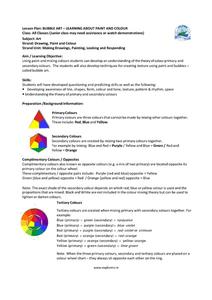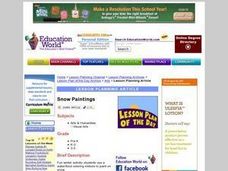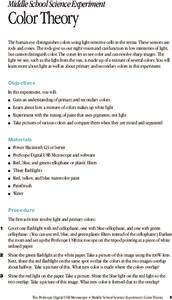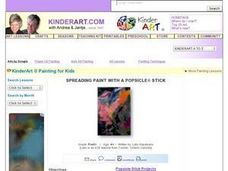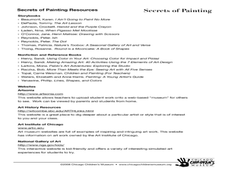Curated OER
Colors, Colors Everywhere
Students mix red, yellow, and blue frosting together to produce secondary colors. Pupils are shown that all colors are made from mixing primary colors of paint together. They discuss the color wheel and spread the "paint" icing on...
Positively Autism
Primary and Secondary Color Worksheets
Here's a worksheet formulated for fun. Kids add two primary colors to produce a secondary color and record the results on train-themed worksheet.
Curated OER
Color Scheme Acrylic Painting Self-Assessment
Being a good artist means being able to critique your own work. Here young painters will take a short quiz on color schemes in acrylic painting and then reflect on their use of color in a recently completed piece. A great worksheet for...
Curated OER
Paint Palette Mixing
New math? Sure. Squirt, mix, and match. They may make a mess, but kids are sure to enjoy squirting primary colors on their pallette, following the visual formula indicated, and presenting their solutions to these color problems.
Curated OER
Emotion Painting
Budding artists explore the nature of emotion through artistic expression. They discuss feelings, colors, line, and design, mix colors and then create an emotive piece that expresses a singular emotion. There are three cross-curricular...
Curated OER
Complementary Superheroes
Students discover the color wheel. In this color lesson, students find the primary colors, secondary colors, and contrasting colors. They look through the designs of super hero logos and create their own using what they know about color.
Curated OER
Sponge Painting Flowers
Explore the shapes and colors of spring with a flower themed painting project. Included here are a list of materials and the instructions needed to execute an art lesson on sponge painting flowers. Tip: Use in conjunction with a flower...
Curated OER
Mixing Colors with Corn Syrup and Food Coloring
Anyone who has worked with small children know that color identification and color mixing can be fun! This simple idea has a lot of potential. It suggests to mix food coloring with corn syrup to provide an opportunity for color mixing...
Curated OER
Painting a Color Wheel
You have to love the color wheel, it's just so colorful! Your kids will love it too, as they work through an introductory exercise which allows them the opportunity to draw and paint a color wheel of their own. This wheel focuses on...
Curated OER
Mixing Primary Colors
Students demonstrate ways to mix primary colors. In this visual arts lesson, students use gelatin and food coloring to create various color mixtures. Students also use tempra paint to mix colors together.
Curated OER
Mouse Painting (Color Mixing)
After reading the story Mouse Paint by Ellen Stoll Walsh, little ones make a mouse painting of their own. They discuss mixing colors, painting, and the story, then they "dance" with their fingers through puddles of paint.
Marine Institute
Bubble Art – Learning About Paint and Color
To gain an understanding of color mixing theory and the color wheel, young artists draw a picture, mix up a batch of secondary colors to which they add dish soap, and using straws, bubble up the paint. They then press their drawings onto...
Curated OER
Snow Paintings
Students work with water and food coloring as their medium to paint snow. They mix primary colors to make new colors while they decide on appropriate for their snow paintings as they relate to the curriculum.
Curated OER
Color Mixing
First graders practice identifying primary and secondary colors by mixing paint. In this colors lesson plan, 1st graders utilize primary colored paint to mix and experiment with in order to create secondary colors. Students paint a...
Art Institute of Chicago
Color Combinations
Explore color through an examination of pointillism and light. Class members view Georges Seraut's famous painting on a computer, zooming in and out to see the details and effects of the technique. They then cover how light and color are...
Curated OER
Color Theory
Students are able to gain an understanding of primary and secondary colors. They are able to explore about how a mixture of colors makes up white light. Students are able to experiment with the mixing of paint that uses pigments, not...
Curated OER
Color the Snow
Are your teaching in a cold and snowy environment? If so, then try out this fun activity with your class. You mix a variety of colors in large jars to show learners the difference between primary and secondary colors, then let them mix...
Curated OER
Spreading Paint with a Popsicle Stick
This one is for the pre-K jet-set. They hone their observation and listening skills as they use Popsicle sticks to apply paint to wax paper. They view how the colors blend and mix together as they move the stick around on the paper.
Curated OER
Primary Color Mixing
Third graders identify secondary colors that are created by mixing primary color paint combinations, and make paintings of their own.
Curated OER
Secrets of Painting
Students explore colors and shapes. In this art concepts lesson, students discuss shapes, lines, and color while creating a variety of abstract designs. The instructions for several art activities are provided. Basic art vocabulary and a...
Curated OER
Colors
Students learn about the Impressionist painters' use of color and how it connected to early nineteenth century scientific theories about color. In this colors lesson plan, students explore combinations of primary and secondary colors,...
Curated OER
Flipping Butterflies: Triadic Colors and Symmetry
Second graders create symmetrical butterfly wings. In this symmetry instructional activity, 2nd graders observe butterfly wings and create their own. They make both sides symmetrical and mix primary colors to make secondary colors.
Curated OER
Exploring Neighborhoods through Art
Students explore neighborhoods. In this color and social studies cross-curriculum lesson, students listen to Harold and the Purple Crayon by Crockett Johnson, then compare and contrast neighborhoods. Students mix primary colors to make...
Curated OER
Play Doh Color Wheel
Students identify primary and secondary colors, and construct color wheels, using Play Doh in the three primary colors.













